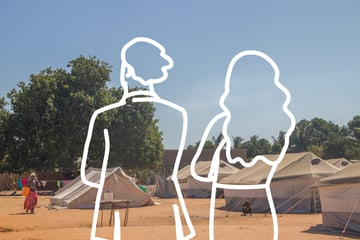1+1 = 3 | How job sharing creates value for an organisation
The job sharing duo of Lisa and Tony is intergenerational, gender-mixed and complementary in terms of the experience they bring: this allows them to cover a complex job with high responsibilities.

At a glance
Work-life balance is a societal issue which is very relevant in the international cooperation sector, as dual careers at international level, in difficult contexts or with frequent changes of duty station, require more flexible working conditions.
Unfortunately, these models are not yet widely applied. cinfo has sought out “success stories” from within and outside international cooperation to illustrate this model in practice and to serve as inspiration for employers and employees.
Our storytellers share their experiences with you.
Lisa and Tony’s story about flexible work arrangements
The day-to-day challenge of selecting, planning and preparing a roster of about 600 Swiss experts in humanitarian aid to be deployed for short and long-term missions in fragile contexts around the globe – like South Sudan, Myanmar, Syria or Venezuela – is a big responsibility. In German, we use the term “Eierlegende Wollmilchsau”, referring to the fact that it’s impossible to cover all the skillset required for such a complex job in one person, a so-called “superhero”. So why not split this complex job into two positions where you divide tasks and share responsibilities?
This is exactly what we have done at SDC, Humanitarian Aid Unit. With over 20 years of HR experience in the Humanitarian Aid Unit (SHA) and a sixth sense for what is going on under the surface, Lisa Lang takes care of selection, planning and organisation of the SHA missions. As a newcomer from the private sector with eight years of field experience in peacebuilding in Latin America, I took over the learning and development section to strengthen organisational change and development. In a Co-Lead model, we are responsible and accountable for the Resources Field section. With over 20 employees, together as a team, Lisa and I take important decisions to best fulfil the mandate of Humanitarian Aid: Save lives and alleviate suffering.
Job sharing gives us a safe space to discuss challenging issues with a true sparring partner. It allows the different stakeholders inside and outside the organisation the possibility to address relevant issues with the person they feel most appropriate. This helps create a work culture based on diversity, knowledge and shared responsibility.
In a nutshell: Mix gender, technical expertise and age to increase your chances of getting more added value for your organisation and yourself.

Tony brings fresh ideas that help us move forward.
Lisa Lang
Lessons learnt and prerequisites
- It’s impossible to overestimate how strongly it depends on the personalities and complementarities of the involved persons to make it work
- Clear definition of roles and responsibilities, avoid same tasks in both job descriptions
- Make sure the stakeholders understand the concept of job and top sharing (communication is key)
Lisa strengthens my back with her experience.
Tony Zuber
The remaining challenges
- You never agree on everything: communication and knowing when to step back will always be challenging
- Transfer the culture of job sharing throughout the whole organisation
- Finding a suitable successor to replace Lisa’s experience after retirement in 2022





